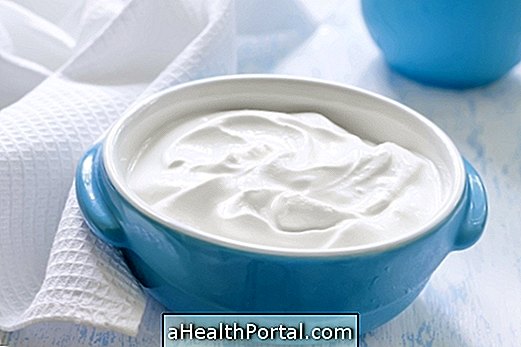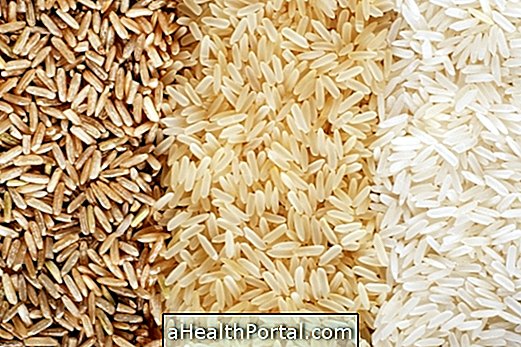Lactobacillus acidophilus, also called L. acidophilus or just acidophilus, is a type of "good" bacteria, known as probiotics, which are present in the gastrointestinal tract, protecting the mucosa and helping the body in the digestion of food.
This specific type of probiotics is known by acidophilus because it produces lactic acid, which happens due to the degradation of the milk by the enzyme lactase, that also is produced by these bacteria.

Probiotics are known to promote intestinal health by helping to relieve symptoms such as excessive gas or diarrhea, for example, but may also have other health benefits. Some of the most important benefits of Lactobacillus acidophilus are:
1. Avoid the onset of diarrhea
In most cases, diarrhea arises due to an intestinal infection caused by "bad" bacteria that develop in the wall of the intestine and cause inflammation, generating soft stools and excess gases. With the consumption of probiotics, such as acidophilus, the chances of having an intestinal infection decrease because the "good" bacteria control the development of other bacteria, preventing them from multiplying too much and causing symptoms.
Therefore, probiotics are important especially in situations where there is a greater risk of having diarrhea, as occurs during treatment with antibiotics, since they help to renew the intestinal flora, which is eliminated with the use of the antibiotic. In these cases, the probiotic should be taken right from the first day the antibiotic is started and maintained for 2 to 4 weeks.
2. Improve Irritable Bowel Symptoms
Irritable bowel syndrome causes very uncomfortable symptoms such as gas excess, abdominal bloating and tummy ache, which can be alleviated with the use of a probiotic such as Lactobacillus acidophilus . This is because when the levels of "good" bacteria are guaranteed, there is greater difficulty to have an imbalance of the intestinal flora, which is also known as dysbiosis and also causes excess gas and abdominal pain.
Many people with irritable bowel also have a picture of dysbiosis, which worsens the symptoms. Thus, when using a probiotic, it is possible to treat dysbiosis and reduce all associated bowel symptoms, especially the sensation of swollen belly and abdominal pain.
3. Strengthen the immune system
The increase of "good" bacteria in the gut, such as L. acidophilus, helps activate the cells of the immune system, which are usually found near the digestive system, especially in the small intestine. Thus, the use of a probiotic can help prevent the emergence of more common infections like influenza or cold, for example.
In addition, as it improves bowel health, consumption of acidophilus also seems to reduce the onset of allergic crises because it reduces the gaps between intestinal cells, decreasing the chances of an allergen substance being absorbed into the bloodstream.

4. Reduce cholesterol levels
Probiotics in general, but especially Lactobacillus acidophilus, seem to reduce the intestinal absorption of cholesterol, which makes their blood levels also decrease. In some cases, consumption of L. acidophilus can reduce LDL levels by up to 7%, known as "bad" cholesterol.
5. Avoiding vaginal infections
Acidophilus bacteria are the most frequent bacteria in the vagina because they produce lactic acid that helps control the growth of "bad" bacteria and fungi that can cause vaginal infections, such as candidiasis. Thus, the consumption of probiotics with L. acidophilus appears to improve vaginal health.
In addition, this type of probiotic can also be applied directly into the vagina to reduce the symptoms of an infection that is already present. To do this, one should open a capsule of the probiotic for 1 or 2 liters of water and make a seat bath. Another effective home-cooked option is to apply natural yogurt directly into the vagina as it is very rich in Lactobacillus acidophilus . Here's how to apply yogurt.
How to take Lactobacillus acidophilus
L. acidophilus can be found in natural products such as yogurt and other dairy products, such as cheese or curd, for example, and therefore its consumption is quite easy.
However, they can also be found in the form of capsule supplements, and may or may not be associated with other probiotics. In these cases, their consumption varies according to the brand and it is recommended to read the package leaflet or directions.
However, it is often advised to take the following steps:
- 1 to 2 capsules during or after a meal;
If you are using any antibiotics, it is recommended to wait at least 2 hours after taking the medicine to avoid the elimination of "good" bacteria.
Possible side effects
The major side effect of using a probiotic such as L. acidophilus is excessive production of intestinal gas. This is because, often, probiotic supplements also contain fructo-oligosaccharides, which function as food for bacteria, but which facilitate the production of gases. A good way to relieve discomfort is to also take a digestive enzyme supplements, such as bromelain or papain.
The use of probiotics is very safe and therefore there are no contraindications as long as the immune system is functioning properly and there is no serious autoimmune disease such as AIDS.


























